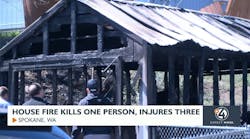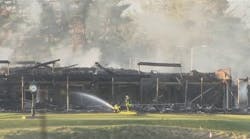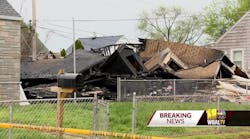This second column in the "Rube's Rules" series relates to courageous leadership. Leading from the front is a simple, straightforward behavior that typically can be accomplished mostly with self-discipline and common sense. It is a concept that is easy to understand and easy to write about; however; at times, it seems difficult to perform. Interestingly, it seems that it is more difficult to lead by example for long periods, such as the length of a fire-rescue service career of 25 or 30 years. With this notion in mind, leading from the front becomes increasingly important to discuss, understand and research further to be successful for the long haul.
There are epic examples of folks saying one thing and doing exactly the opposite. "Do as I say and not as I do" doesn't sell in America and is even weaker in emergency response circles. Do you remember the fire investigator John Orr? He was a highly decorated fire service professional who seemed to be on top of his game in every aspect. He was seemingly a very effective and respected battalion chief in Southern California who was revered by many. In fact, Orr was a sought-after lecturer and author on the topic of fire and arson investigations. Little did we know the real character of that man who was wearing the firefighter's uniform.
The fire service was amazed to find out that Orr was one of America's most notorious and destructive serial arsonists. He was found guilty of setting dozens of fires up and down the West Coast and even was responsible for several fire fatalities. As Orr would travel to deliver lectures on the topic of investigating arson fires, he would stop along the way and set significant buildings on fire. Then, Orr would "just happen" to be in town after these major events, he would offer his services to the local fire marshal and he could seemingly do the nearly impossible by determining the cause of the fire quickly, accurately and effectively. I guess it helped that he had set the fires a few hours earlier. After being found guilty by a jury of his peers, Orr is now in a federal penitentiary serving a life sentence for multiple counts of murder and arson.
Put your leadership into practice. To put this rule into the context of your day-to-day leadership style, everyone in your agency is watching you. The members in your outfit hear you as well, but your actions are what they see, react to and remember. To be a courageous leader by today's standards, your words and the actions must line up and be in sync. As a leader in your agency, there can be very little to no difference between what you say you are going to do and what you actually do. The best advice that I can give to you is to determine what your core values are and stick with them.
Most fire-rescue department leaders, from senior firefighter to fire chief, prepare and circulate a wealth of written documents (memos, e-mails, member evaluations, reports and the like). The point is that just about every member of the organization can read or hear what you are saying. Your written words have been captured (in some form or another) for all time's sake and your actions (performance) must agree with what you say.
Many years ago, I came across a video that helps me stay focused on understanding the concept of leading from the front. A local TV station produced an undercover news program titled "Men at Work." The program compared public works departments in three communities performing such duties as street repairs and litter removal. Two performed above the viewers' (and media's) expectations. The news reporter raved about the workers, the supervision, the management performance and the government employees in general. Undercover reporting in the third community, however, left viewers wondering whether any work was performed by the public works department or, for that matter, by any city employees. It was an indictment of all government employees — not caring, not performing their required duties and simply violating the public trust. One supervisor was caught on tape littering and even relieving his bladder in public on the very street he was charged with keeping clean.
What were they thinking? What would the results be if the local media spent a day secretly following you and your crew for 12 hours? And, finally, we (the classes and I) have focused on the fact that we (fire and rescue) are a highly scrutinized and highly visible agency. We must always think about how we look to our key stakeholders (citizens and visitors) and always, I mean always, lead from the front.
Always remember that someone is watching you. Whether it is the public, the media or your own people, they are watching!
Dennis L. Rubin, a Firehouse® contributing editor, is chief of the District of Columbia Fire and Emergency Medical Services Department. Previously, Rubin was chief of the Atlanta, GA, Fire and Rescue Department. He holds a bachelor of science degree in fire administration from the University of Maryland and an associate in applied science degree in fire science management from Northern Virginia Community College, and is enrolled in the Fire and Emergency Management Administration program at the graduate school of Oklahoma State University. Rubin is a graduate of the National Fire Academy's Executive Fire Officers Program, is a Certified Emergency Manager (CEM) and has obtained the Chief Fire Officer (CFO) designation from the International Association of Fire Chiefs (IAFC). He is an adjunct faculty member of the National Fire Academy author of the book Rube's Rules for Survival.





